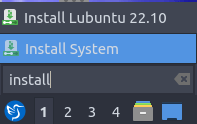The latest interim release of Ubuntu helps IoT developers and enterprise administrators.
20 October 2022:
Ubuntu 22.10 will be available to download and install later today from https://ubuntu.com/download.
Codenamed “Kinetic Kudu”, this interim release improves the experience of enterprise developers and IT administrators. It also includes the latest toolchains and applications with a particular focus on the IoT ecosystem.
“Connected devices are an exciting area of innovation that also create new digital risks in the home and the business. We are focused on enabling a new generation of easy to use and highly secure IoT, so these developers in particular will find a number of quality of life improvements for embedded device and remote development in Ubuntu 22.10”, said Mark Shuttleworth, CEO of Canonical. ”This release also brings new capabilities to our enterprise management story. The new Landscape beta makes it easier than ever to administer your entire Ubuntu estate across any architecture”.
New tools to optimise developer workflows
Ubuntu 22.10 delivers toolchain updates to Ruby, Go, GCC and Rust.
OpenSSH in Ubuntu 22.10 is configured by default to use systemd socket activation, meaning that sshd will not be started until an incoming connection request is received. This reduces the memory footprint of Ubuntu Server on smaller devices, VMs or LXD containers.
Ubuntu 22.10 also comes with a new debuginfod service to help developers and admins debug programs shipped with Ubuntu. Debugging tools like gdb will automatically download the required debug symbols over HTTPS.
Support for microcontrollers and embedded displays on the Raspberry Pi
Ubuntu 22.10 now supports MicroPython on a variety of microcontrollers, including the Raspberry Pi Pico W. rshell, thonny and mpremote are all available in the Ubuntu repositories.
The Ubuntu graphics stack transition to kms means developers can run Pi-based graphical applications using frameworks like Qt outside of a desktop session and without Pi specific drivers. This complements expanded support for a range of embedded displays for the Raspberry Pi, including the Inky eInk HAT series, Hyperpixel range and the Raspberry Pi Official Touchscreen.
Upgraded enterprise management tooling
The new Landscape 22.10 beta makes it easier to run and manage Ubuntu on any architecture with monitoring, managing, patching and compliance reporting across Ubuntu estates from server to desktop. Users can now install Landscape Server on computers with Arm or Arm-based processors, including Ampere® Altra®- based ARM64 virtual machines on public cloud and the Raspberry Pi, to simplify home administration.
RISC-V processors and hardware are also supported in this release, making it easy to deploy Landscape as a portable management system.
Improved desktop usability and performance
All users will benefit from the refinements in GNOME 43, including GTK4 theming for improved performance and consistency. Quick Settings now provide faster access to commonly used options such as wifi, bluetooth, dark mode and power settings.
The Pipewire audio platform broadens support for audio devices and provides a step up in bluetooth connectivity, delivering improved performance for video conferencing. Linux 5.19 improves the power performance of intel devices and now includes multithreaded decompression on Ubuntu to improve multi-core desktop snap performance.
Finally, the new Steam snap available on Ubuntu Software includes the latest Mesa, so that gamers can be confident they’re always up to date regardless of their host OS and without the need to configure additional PPAs.
More resources
- Download Ubuntu 22.10
- Release notes
- Ubuntu Discourse community
- Landscape beta
- What’s new for Raspberry Pi
About Canonical
Canonical is the publisher of Ubuntu, the OS for most public cloud workloads as well as the emerging categories of smart gateways, self-driving cars and advanced robots. Canonical provides enterprise security, support and services to commercial users of Ubuntu. Established in 2004, Canonical is a privately held company.
Discover more from Ubuntu-Server.com
Subscribe to get the latest posts sent to your email.



